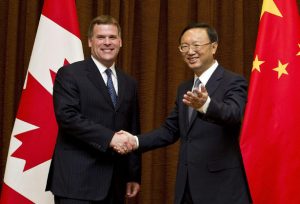Memo #99
By Paul Evans – paul.evans [at] ubc.ca
 The world is being reshaped by China’s rise, its central role in regional production networks and global value chains, its deepening influence in international institutions, and the persistence of its particular form of authoritarian capitalism.
The world is being reshaped by China’s rise, its central role in regional production networks and global value chains, its deepening influence in international institutions, and the persistence of its particular form of authoritarian capitalism.
Decisions of Chinese officials, business leaders, citizens, and consumers have impact globally in a messy, multi-centric world order.
How to respond to global China?
Excellent surveys by the BBC World Service, the Lowy Institute for International Policy in Australia, and the Asia Pacific Foundation of Canada reveal two main patterns in public attitudes.
First is the perception that China is big, important, and getting more so. Respondents around the world expect China soon to overtake the United States in economic importance. More than half of Australians believe that China is already the world’s leading economy. In Canada almost two thirds believe that within a decade Chinese power will surpass that of the US.
Second is a blend of uncertainty, anxiety, and fear about what this means. In the areas of human rights, domestic governance, environment, military modernization, and product safety there is near universal concern. There is even growing worry in many countries on China’s economic impact. In Canada those who saw China as an opportunity fell from 60 per cent in 2009 to 43 per cent in 2011.
Meanwhile, political leaders from virtually every country are pushing for deeper and more extensive relations with Beijing even as several are subtly hedging against the rise of Chinese power.
Recent shifts in Conservative Ottawa’s China policy have been dramatic. The Harper visit to China in December 2009 was a tipping point after three years of “cool politics and warm economics” during which China was frequently characterized as a godless totalitarian country with nuclear weapons. The new Minister of Foreign Affairs, John Baird, pronounced in China earlier this week that Canada and China are not only “strategic partners” and “friends,” they are “allies.”
The shift, save for the ill-conceived vocabulary of “allies,” makes good strategic and commercial sense. But it needs to be explained and justified, especially by a Conservative government that has touted a “principled foreign policy” emphasizing freedom, democracy, human rights, and the rule of law.
Making the case for deeper engagement will need a moral as well as a realpolitik underpinning.
About the Author:
Paul Evans – Director, Institute of Asian Research, The University of British Columbia.
Links:
- Effusive John Baird wraps up China visit with praise for ‘strategic partner’, The Globe and Mail, July 2011
- Australia and the world: public opinion and foreign policy, Lowy Institute for International Policy, 2011 (see the reports, published annually since 2005, on Lowy Institute’s website)
- Rising Concern about China’s Increasing Power: Global Poll, BBC World Service, March 2011 (see the reports from 2005 and 2009 on BBC World Service’s website)
- 2011 National Opinion Poll: Canadian Views on Asia, Asia Pacific Foundation of Canada, 2011 (see the reports from 2004, 2006, 2008, and 2010 on the Foundation’s website)
- China Seen Overtaking U.S. as Global Superpower, Pew Research Center, July 2011 (see the 2007 report on the Pew Research Center’s website)
Related Memos:
- Through Taiwan is the Shortest Route between Japan and China, by David Edgington (Memo #98)
- Canada and China: Facilitating Transactions or Building a Strategic Understanding, by Paul Evans (Memo #45)
